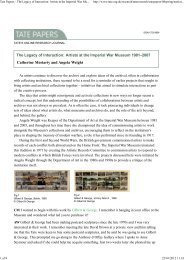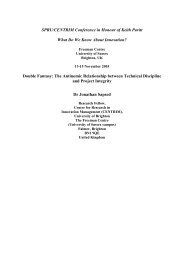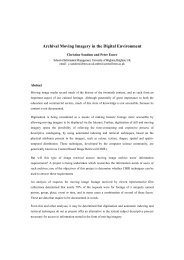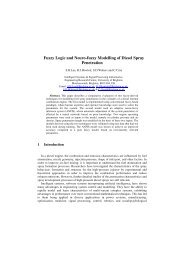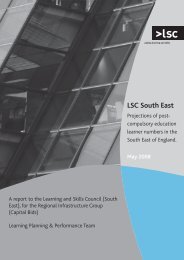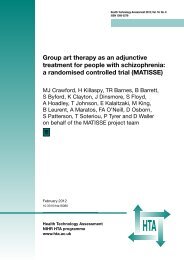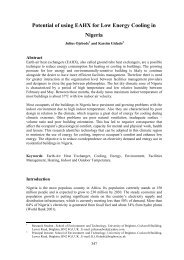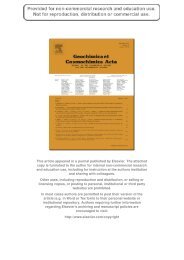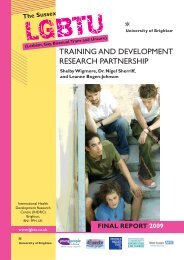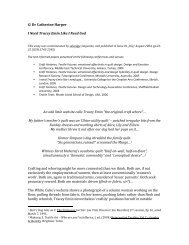Everywhere Manual - the Everywhere Project
Everywhere Manual - the Everywhere Project
Everywhere Manual - the Everywhere Project
You also want an ePaper? Increase the reach of your titles
YUMPU automatically turns print PDFs into web optimized ePapers that Google loves.
Responsible and safer places where men<br />
have sex with men....<strong>Everywhere</strong><br />
A European Seal of Approval<br />
in HIV prevention for ‘gay’<br />
and MSM businesses<br />
www.everywhereproject.eu
EVERYWHERE PROJECT<br />
ii<br />
The <strong>Everywhere</strong> <strong>Project</strong> is co-funded by <strong>the</strong><br />
European Commission (Executive Agency for<br />
Health and Consumers) under <strong>the</strong> Public<br />
Health Programme 2003-2008. Nei<strong>the</strong>r <strong>the</strong><br />
European Commission nor any person acting<br />
on its behalf is liable for any use of <strong>the</strong><br />
information contained in this publication.<br />
Copyright © remains with <strong>the</strong> author(s) on behalf<br />
of <strong>the</strong> <strong>Everywhere</strong> Consortium and <strong>the</strong> publisher.<br />
Published by <strong>the</strong> University of Brighton.<br />
© University of Brighton, 2010.<br />
All rights reserved. No part of this report may be<br />
reprinted or reproduced or utilised in any form or<br />
by any electronic, mechanical, or o<strong>the</strong>r means,<br />
now known or hereafter invented, including<br />
photocopying and recording, or in any information<br />
storage or retrieval system, without permission in<br />
writing from <strong>the</strong> publishers.<br />
Web: www.everywhereproject.eu<br />
Email: info@everywhereproject.eu<br />
Suggested citation:<br />
Sherriff, N.S., McDonnell, E.,<br />
Sutton, F., Tunstall, B., Alexandre, A.,<br />
Friboulet, D., Martín-Pérez, A., and<br />
Hernández-Fernández, T. on behalf<br />
of <strong>the</strong> <strong>Everywhere</strong> Consortium<br />
(2010).<br />
<strong>Everywhere</strong>: A European Seal of<br />
Approval in HIV Prevention for ‘Gay’<br />
and MSM businesses. Brighton;<br />
University of Brighton.<br />
www.everywhereproject.eu<br />
<strong>Everywhere</strong> <strong>Project</strong> Secretariat<br />
International Health Development Research Centre (IHDRC)<br />
University of Brighton<br />
Mayfield House<br />
Brighton, BN1 9PH, UK<br />
Tel: +44 (0)1273 644539<br />
Fax: +44 (0)1273 644508<br />
Email: info@everywhereproject.eu<br />
Web: www.brighton.ac.uk/snm/research/ihdrc<br />
www.everywhereproject.eu<br />
The views expressed in this publication are those of <strong>the</strong> <strong>Everywhere</strong> <strong>Project</strong> and not necessarily<br />
those of <strong>the</strong> European Commission or <strong>the</strong> Executive Agency for Health and Consumers
CONTENTS<br />
Authors iv<br />
Executive Summary v<br />
Acknowledgements vi<br />
Using this Guide vii<br />
SECTION ONE<br />
Introduction<br />
HIV in Europe 2<br />
Involving ‘Gay’ Businesses in HIV Prevention 3<br />
<strong>Everywhere</strong>: A European Model of HIV Prevention 4<br />
SECTION TWO<br />
<strong>Everywhere</strong> Seal of Approval 8<br />
Minimum Standards 9<br />
Premium Standards 9<br />
Eligible Businesses 10<br />
Benefits for ‘Gay’ Businesses 11<br />
Assessment & Monitoring 12<br />
Social Mediator Network 12<br />
Training of <strong>Everywhere</strong> Social Mediators 13<br />
Training <strong>the</strong> Trainer Model 13<br />
Examples of <strong>Everywhere</strong> Social Mediation Tools 14<br />
Getting <strong>Everywhere</strong> Certified 15<br />
Branding and Compliance 16<br />
SECTION THREE<br />
Glossary 18<br />
<strong>Everywhere</strong> Certified Businesses (2010-2011) 21<br />
The <strong>Everywhere</strong> Consortium 24<br />
iii
AUTHORS *<br />
iv<br />
Nigel Sherriff, Elizabeth McDonnell, and Fiona Sutton<br />
International Health Development Research Centre,<br />
University of Brighton, UK<br />
Ben Tunstall<br />
Terrence Higgins Trust<br />
Antonio Alexandre and David Friboulet<br />
Syndicat National Des Entreprises Gaies<br />
Alberto Martin-Perez and Tomas Hernandez<br />
Ministerio de Sanidad y Política Social<br />
*On behalf of <strong>the</strong> <strong>Everywhere</strong> Consortium
Executive Summary<br />
This Guide is informed by <strong>the</strong> findings of <strong>the</strong> <strong>Everywhere</strong> <strong>Project</strong> co-funded by <strong>the</strong><br />
European Commission (see www.everywhereproject.eu). It outlines a series of HIV and<br />
STI prevention standards for ‘gay’ businesses including sex venues, ‘gay’ and gayfriendly<br />
social places (e.g. clubs, bars, discos etc), travel agencies, hotels, and ‘gay’<br />
dating websites.<br />
These <strong>Everywhere</strong> Standards set out a series of actions which, if adopted, lead to a<br />
business being awarded with ei<strong>the</strong>r <strong>the</strong> <strong>Everywhere</strong> Minimum Seal of Approval or <strong>the</strong><br />
<strong>Everywhere</strong> Premium Seal of Approval. These two Seals (reflecting different levels of<br />
involvement) certify <strong>the</strong> businesses as being socially responsible in HIV prevention and<br />
caring for <strong>the</strong>ir customers’ health.<br />
In <strong>the</strong> <strong>Everywhere</strong> <strong>Project</strong>, trained Social Mediators work directly with ‘gay’ businesses<br />
to facilitate <strong>the</strong> achievement of <strong>the</strong> Minimum or Premium <strong>Everywhere</strong> Seal of Approval.<br />
Each country partner has at least one named <strong>Everywhere</strong> Social Mediator who is<br />
responsible for assessing, monitoring, and awarding businesses <strong>the</strong> <strong>Everywhere</strong> Seal.<br />
A requirement of certification is that <strong>the</strong> <strong>Everywhere</strong> Seal is displayed publically by <strong>the</strong><br />
business enabling MSM (Men who have Sex with Men) travelling across partner<br />
countries to recognise easily <strong>Everywhere</strong> approved ‘gay’ businesses. This empowers<br />
MSM to make conscious choices to use those businesses certified with <strong>the</strong> <strong>Everywhere</strong><br />
Seal of Approval (Minimum or Premium) knowing <strong>the</strong>y can expect consistent HIV/STI<br />
prevention standards.<br />
The principles set out in <strong>the</strong> <strong>Everywhere</strong><br />
Standards include:<br />
• Condoms and lubricant provision (Minimum and<br />
Premium)<br />
• Information availability (Minimum and Premium)<br />
• Staff knowledge about <strong>Everywhere</strong> (Minimum and<br />
Premium)<br />
• A safer environment (Premium)<br />
• Welcoming of outreach workers (Premium)<br />
• Regular knowledge updates for staff (Premium)<br />
• Commitment to anti-discrimination (Premium)<br />
The <strong>Everywhere</strong> Standards can be used ei<strong>the</strong>r alongside<br />
existing policies and guidelines or as a ‘stand-alone’ code<br />
where no policies or guidelines currently exist.<br />
EXECUTIVE SUMMARY<br />
v
ACKNOWLEDGEMENTS<br />
vi<br />
Acknowledgements<br />
We would like to thank <strong>the</strong> European Commission (Executive Agency for Health<br />
and Consumers) for its support in providing co-funding for <strong>the</strong> <strong>Everywhere</strong><br />
<strong>Project</strong> (2008-2010), and particularly to Cinthia Menol-Lemos. We are also<br />
grateful to all those businesses who willingly and enthusiastically gave up<br />
<strong>the</strong>ir time to be interviewed during <strong>the</strong> development of <strong>the</strong> <strong>Everywhere</strong><br />
Standards, and <strong>the</strong> <strong>Everywhere</strong> Seal of Approval. Their cooperation and<br />
input is greatly appreciated.<br />
Thanks to Gloria Arredondo, Daniela Rojas, María Santaolaya, Sara Gil,<br />
Guillermo López, Oscar Miras, Jose Fernández Quero, and Fernando<br />
Villaamil.<br />
We are also grateful for <strong>the</strong> comments and suggestions of <strong>the</strong><br />
<strong>Everywhere</strong> Expert Advisory Group, particularly Dr Arantxa Santa-<br />
Maria Morales, Caroline Hall, Jonathon Roberts, Professor John<br />
Kenneth Davies, and Simon Parkyn. Our appreciation is extended to<br />
our colleagues at CM Colour for developing <strong>the</strong> visual design for <strong>the</strong><br />
project, to Karen Akroyd, and to Glynis Flood for administrative<br />
support in <strong>the</strong> early stages of <strong>the</strong> <strong>Project</strong>.<br />
Finally, our thanks to our many colleagues and partners who expressed<br />
<strong>the</strong>ir belief and confidence in <strong>Everywhere</strong> and whom have collaborated<br />
and shared <strong>the</strong>ir expertise with us often on a voluntary basis.<br />
Dr Nigel Sherriff<br />
<strong>Everywhere</strong> <strong>Project</strong> Manager * †<br />
* On behalf of <strong>the</strong> <strong>Everywhere</strong> <strong>Project</strong> Steering Committee:<br />
• Ben Tunstall (Terrence Higgins Trust, UK)<br />
• Dr Constantinos Phellas (Research Unit in Behaviour and Social Issues, Cyprus)<br />
• Monica Moran and Dr Ramon Aguirre (Dirección General de Attención Primaria, Spain)<br />
• Alberto Martin-Perez, Dr Tomas Hernandez, Raul Soriano (Ministerio de Salud y Politica<br />
Social, Spain)<br />
• Antonio Alexandre and David Friboulet (Syndicat National Des Entreprises Gaies, SNEG,<br />
France)<br />
• László Mocsonaki (Háttér Társaság a Melegekért, Hungary)<br />
• Ibrahim Osmani and Tania Re (Società Ricerca e Formazione, Italy)<br />
• Izabela Pazdan and Tomek Malkuszewski (Spoleczny Komitet ds. AIDS, Poland)<br />
• Carmine Falanga (Associazione Nazionale Per La Lotta Contro L'aids - Sezione<br />
Lombarda, Italy)<br />
• Miran Šolinc (Društvo študentski kulturni center, Slovenia)<br />
• Dr Nigel Sherriff, Dr Liz McDonnell (2009-2010), Elizabeth Pottinger, and Fiona Sutton<br />
(University of Brighton, UK) - Coordinator<br />
† Dirección General de Atención Primaria (DGAP) co-ordinated <strong>the</strong> <strong>Everywhere</strong> project under<br />
<strong>the</strong> directorship of Dr Ramón Aguirre April 2008-April 2009.
What is this Guide and who is it for?<br />
This Guide is based on <strong>the</strong> findings of <strong>the</strong> <strong>Everywhere</strong> Pilot <strong>Project</strong><br />
(www.everywhereproject.eu). Co-funded by <strong>the</strong> European Commission’s Public Health<br />
Programme, <strong>the</strong> <strong>Everywhere</strong> <strong>Project</strong> aims to impact on <strong>the</strong> HIV epidemic in Europe by<br />
preventing new infections in MSM. Specifically, it provides a pre-tested model of HIV<br />
prevention to gain <strong>the</strong> commitment of ‘gay’ businesses that bring men toge<strong>the</strong>r and<br />
facilitate sex between <strong>the</strong>m, particularly in ‘gay’ tourist destinations and o<strong>the</strong>r European<br />
capital cities.<br />
The Guide is intended for use particularly by public health organisations, academic<br />
organisations, and non-governmental organisations (NGOs) active in HIV issues, and<br />
organisations that unite gay business owners. The intention is for <strong>the</strong> Guide to convey <strong>the</strong><br />
experiences of <strong>the</strong> <strong>Everywhere</strong> Consortium, and in this way, assist those ei<strong>the</strong>r currently<br />
working with, or interested in working with, <strong>the</strong> ‘gay’ business sector and o<strong>the</strong>r<br />
stakeholders in HIV prevention targeting MSM at European level.<br />
Why is this Guide useful?<br />
This Guide has been developed and approved by <strong>the</strong> European <strong>Everywhere</strong> Consortium<br />
comprising of 17 partners from eight European countries including Cyprus, France,<br />
Hungary, Italy, Poland, Slovenia, Spain and <strong>the</strong> UK. The Guide is intended to be useful in<br />
several ways including <strong>the</strong> following:<br />
• To raise awareness about <strong>the</strong> importance of involving ‘gay’ businesses in HIV<br />
prevention and to illustrate work at <strong>the</strong> European and/or international level;<br />
• To learn about how <strong>the</strong> <strong>Everywhere</strong> Model intervention can be implemented<br />
involving <strong>the</strong> ‘gay’ business sector and o<strong>the</strong>r stakeholders in HIV prevention<br />
targeting MSM at national and European level;<br />
• As an information resource - This Guide provides a source of information to enable<br />
readers to take advantage of <strong>the</strong> <strong>Everywhere</strong> experience that has been piloted in<br />
eight European countries with different HIV epidemics, diverse HIV prevention<br />
approaches, and where MSM experience differential social status. It also provides<br />
a point of reference for contacting <strong>the</strong> authors and partners of <strong>the</strong> <strong>Everywhere</strong><br />
<strong>Project</strong> and to gain more information.<br />
USING THIS GIUIDE<br />
vii
1<br />
INTRODUCTION<br />
SECTION ONE<br />
Men who have sex<br />
with men (MSM) are<br />
<strong>the</strong> main at-risk<br />
population in <strong>the</strong><br />
European Union of<br />
HIV and o<strong>the</strong>r<br />
sexually transmitted<br />
infections.
INTRODUCTION<br />
HIV in Europe<br />
HIV continues to be a major public health issue across <strong>the</strong> Member States of <strong>the</strong><br />
European Union (EU) and <strong>the</strong> European neighbouring countries. Each year approximately<br />
25,000 newly diagnosed cases of HIV are reported by <strong>the</strong> countries of <strong>the</strong> European<br />
Union and European Economic Area; <strong>the</strong>se figures have almost doubled since <strong>the</strong> late<br />
nineties and continue to increase [1]. Although <strong>the</strong> highest absolute numbers of new HIV<br />
cases in <strong>the</strong> EU occur through heterosexual transmission, men who have sex with men<br />
(MSM) are over proportionally affected and continue to represent a population at high<br />
risk of HIV and o<strong>the</strong>r sexually transmitted infections (STIs) such as syphilis and<br />
gonorrhoea [2,3,4]. Increases in newly diagnosed cases amongst MSM have occurred not<br />
only in countries with large and visible gay communities such as in <strong>the</strong> UK and Germany,<br />
but also in many eastern and central European countries where despite absolute<br />
numbers remaining low, rapid increases have none<strong>the</strong>less been reported [5].<br />
In many European countries, a reappearance of high risk sexual practices amongst MSM<br />
has been reported linking with o<strong>the</strong>r contributing factors such as <strong>the</strong> use of alcohol,<br />
o<strong>the</strong>rpsychoactive drugs and prevention fatigue. For instance, studies have<br />
demonstrated increases in unprotected anal intercourse (UAI), increases in <strong>the</strong> number<br />
of sexual partners, and have shown positive associations between <strong>the</strong> use of alcohol and<br />
drugs before and during sex and increased sexual risk behaviour [6-8].<br />
Such trends, combined with <strong>the</strong> high prevalence of HIV reported in many gay community<br />
settings, <strong>the</strong> high prevalence of HIV among MSM diagnosed with STIs, and <strong>the</strong> high<br />
sexual mobility of this population, need to be located within a broader European context.<br />
Globalisation, migratory flows, new technologies, increased tourism and cheaper travel<br />
have meant that more men are travelling abroad to have sex with o<strong>the</strong>r men than ever<br />
before. ‘Gay’ tourism in particular is a phenomenon of considerable proportions due to<br />
both <strong>the</strong> numbers of people that travel throughout <strong>the</strong> European Union, as well as <strong>the</strong><br />
associated economic repercussions for Member States. In each of <strong>the</strong>se countries, <strong>the</strong><br />
implications with regards to HIV prevention and harm reduction is different given <strong>the</strong><br />
enormous diversity of context and experience within and across <strong>the</strong> countries of Europe.<br />
Combined with increasing social and sexual MSM networks between European<br />
countries, <strong>the</strong> need for effective and coordinated European action with regards HIV<br />
prevention methods is becoming increasingly urgent.<br />
2
INTRODUCTION<br />
3<br />
In <strong>the</strong> context of <strong>the</strong> European Union, public health and health promotion strategies and<br />
interventions must necessarily include a European dimension. In <strong>the</strong> case of HIV<br />
infection, this European perspective is of considerable importance as population<br />
movement related to tourism and economic migration, and <strong>the</strong> different conceptions of<br />
positive health, illness, and sexuality in <strong>the</strong> different cultures are elements that<br />
determine, to a great extent, <strong>the</strong> characteristics of <strong>the</strong> epidemic in <strong>the</strong> Union.<br />
However, interventions addressing major health threats with a cross-border<br />
or global impact such as HIV also require intersectoral action at<br />
European level if <strong>the</strong>y are to have <strong>the</strong> greatest<br />
potential of being effective.<br />
In <strong>the</strong> European Union,<br />
public health and health<br />
promotion strategies and<br />
interventions focusing on<br />
MSM, must necessarily<br />
include a European<br />
dimension.<br />
In o<strong>the</strong>r words, public health interventions<br />
aimed at preventing new infections amongst<br />
MSM need to involve all <strong>the</strong> sectors/agents relevant to <strong>the</strong> problem within and across<br />
Member States, and in this way, contribute to <strong>the</strong> development of European interventions<br />
that foster cross-sectoral collaborations. Such action is essential given many influences<br />
shaping <strong>the</strong> health of populations and <strong>the</strong> distribution of health inequities are often<br />
located outside of <strong>the</strong> traditional public health sector.<br />
Involving ‘Gay’ Businesses in HIV Prevention<br />
Sex between men occurs in most societies and in diverse circumstances amongst men<br />
whose experiences, lifestyles, behaviours and associated risks for HIV vary greatly. It<br />
encompasses a range of sexual and gender identities among people in various sociocultural<br />
contexts. Sex between men may involve men who self-identify as homosexual,<br />
gay, bisexual, transgendered or heterosexual. Some MSM are married to women,<br />
particularly where discriminatory laws or social stigma of male sexual relations exist [9].<br />
In most European countries, MSM remain one of <strong>the</strong> most hidden parts of society.<br />
Stigma, discrimination, and homophobia (amongst o<strong>the</strong>rs) are often associated with sex<br />
between men which can cause MSM (both HIV-positive and HIV-negative) to ‘avoid or<br />
fear accessing health services including counselling and testing, treatment, prevention,<br />
and support’ [10].<br />
Consequently, businesses can be key sites through which to deliver public health and<br />
health promotion HIV interventions for ‘hidden’ and marginalised MSM, particularly<br />
those that ei<strong>the</strong>r provide specific spaces or locations in which sex can occur (e.g. sex<br />
venues and saunas) or those that merely facilitate sex between men (e.g. ‘gay’ and gayfriendly<br />
social places such as bars and clubs).
Businesses can be key sites through which to<br />
deliver public health and health promotion HIV<br />
interventions for ‘hidden’ and marginalised MSM…<br />
Indeed gay businesses that provide physical sex spaces for MSM and provide<br />
opportunities in which MSM may meet one ano<strong>the</strong>r to find sexual partners and/or social<br />
support, have been shown empirically to be useful venues for public health interventions<br />
[11]. However, such interventions are not common and have yet to be implemented<br />
widely ei<strong>the</strong>r at local/national level or European level. Moreover, public health<br />
interventions also need to consider <strong>the</strong> growing number of virtual businesses which<br />
many MSM access and participate in for social and sexual activities (e.g. websites, chat<br />
rooms, mobile phone applications, and so on). Whilst such virtual communities are<br />
undoubtedly popular amongst MSM due to a range of factors such as accessibility,<br />
affordability, anonymity, and acceptability, <strong>the</strong>y are also likely to contribute to increasing<br />
HIV prevalence in MSM [12]. However, as with physical ‘gay’ businesses, virtual ‘gay’<br />
businesses can also provide important opportunities for public health and health<br />
promotion to engage with MSM easily and quickly to deliver HIV prevention and o<strong>the</strong>r<br />
health initiatives.<br />
<strong>Everywhere</strong>: A European Model of HIV Prevention<br />
Increasing <strong>the</strong> number and types of business sites delivering HIV prevention provides<br />
new opportunities to challenge <strong>the</strong> epidemic within and between Member States. Cofunded<br />
by <strong>the</strong> European Commission’s Public Health Programme 2003-2008, <strong>the</strong><br />
<strong>Everywhere</strong> <strong>Project</strong> pilot phase (2008-10) aims to impact on <strong>the</strong> HIV epidemic by<br />
preventing new infections through gaining <strong>the</strong> commitment of ‘gay’ businesses that<br />
bring men toge<strong>the</strong>r and facilitate sex between <strong>the</strong>m, particularly in ‘gay’<br />
tourist destinations and European capital cities. Coordinated by <strong>the</strong><br />
University of Brighton, <strong>the</strong> <strong>Everywhere</strong> <strong>Project</strong> (2008-2010) is<br />
a multi-partner consortium comprising 17<br />
partners from eight European countries<br />
including Cyprus, France, Hungary, Italy,<br />
Poland, Slovenia, Spain and <strong>the</strong> UK.<br />
The consortium includes public<br />
health organisations, academic<br />
organisations, NGOs active in HIV<br />
issues, and organisations that<br />
unite gay business owners.<br />
<strong>Everywhere</strong> aims to<br />
impact on <strong>the</strong> HIV epidemic<br />
by preventing new<br />
infections through gaining<br />
<strong>the</strong> commitment of ‘gay’<br />
businesses in Europe.<br />
Although <strong>Everywhere</strong> does not<br />
engage with MSM directly, MSM<br />
are reached innovatively through<br />
collaborating with ‘gay’ businesses<br />
in each of <strong>the</strong> partner countries. By<br />
working intersectorally <strong>the</strong> Consortium<br />
has developed a networking methodology<br />
that provides cohesion amongst partners<br />
and has led to <strong>the</strong> creation of a trained European network of Social Mediators<br />
specialised in identifying, accessing, and achieving <strong>the</strong> commitment of <strong>the</strong> businesses<br />
sector in <strong>the</strong> prevention of HIV and STIs.<br />
INTRODUCTION<br />
4
INTRODUCTION<br />
5<br />
A Recognisable ‘Seal of Approval’ in Europe<br />
Given MSM have a high rate of mobility; <strong>the</strong>re is an urgent need for European HIV<br />
prevention approaches to be common, visible, and easily recognisable by travelling MSM<br />
within and between Members States of <strong>the</strong> EU.<br />
Similar HIV prevention codes, policies, or quality ‘Seals’ to <strong>Everywhere</strong> do already exist<br />
in some European countries including, amongst o<strong>the</strong>rs, <strong>the</strong> UK (Playzone), France<br />
(Charter of Responsibility), Germany (Safe Environment Prevention Standards), and <strong>the</strong><br />
Ne<strong>the</strong>rlands (Safe Sex Zone Charter). However, whilst such schemes are valuable and to<br />
be commended, <strong>the</strong>y are rarely known or transferred to o<strong>the</strong>r countries as <strong>the</strong>y operate<br />
mostly at local or National levels. For example, although codes such as Playzone may be<br />
well known in <strong>the</strong> UK amongst English MSM using sex venues in London or Brighton,<br />
once <strong>the</strong> English MSM travels to ano<strong>the</strong>r EU country <strong>the</strong> code becomes relatively<br />
meaningless as <strong>the</strong> scheme does not operate in any o<strong>the</strong>r European country o<strong>the</strong>r than<br />
England. This is an important gap given <strong>the</strong> high levels of tourism and mobility of MSM in<br />
Europe, and particularly to ‘gay’ tourist destinations and o<strong>the</strong>r capital cities.<br />
To meet this gap, <strong>Everywhere</strong> provides a European level scheme that sets out a<br />
series of HIV prevention standards for ‘gay’ businesses that are common<br />
across <strong>the</strong> eight partner countries.<br />
These <strong>Everywhere</strong> Minimum and Premium<br />
Standards set out a series of actions<br />
which, if adopted, lead to <strong>the</strong><br />
businesses being awarded with<br />
ei<strong>the</strong>r <strong>the</strong> <strong>Everywhere</strong> Minimum<br />
Seal of Approval or <strong>the</strong><br />
<strong>Everywhere</strong> Premium Seal of<br />
Approval. These two<br />
<strong>Everywhere</strong> Seals certifies<br />
<strong>the</strong> business (whilst<br />
acknowledging different<br />
levels of involvement) as<br />
being socially responsible in<br />
HIV prevention and caring for<br />
its customers’ health.<br />
<strong>Everywhere</strong> provides a<br />
series of HIV prevention<br />
standards for ‘gay’<br />
businesses that are common<br />
across Cyprus, France,<br />
Hungary, Italy, Poland,<br />
Slovenia, Spain and <strong>the</strong> UK.<br />
As <strong>the</strong> <strong>Everywhere</strong> Seal of Approval<br />
is both common amongst partner<br />
countries and highly visible (it is a<br />
requirement of certification that businesses<br />
display <strong>the</strong> Seal publically), travelling MSM are now able to recognise easily (through<br />
simple but effective design), <strong>Everywhere</strong> approved or certified ‘gay’ businesses. In this<br />
way, MSM are empowered to make conscious choices to use those businesses that are<br />
<strong>Everywhere</strong> certified knowing that wherever <strong>the</strong> <strong>Everywhere</strong> Seal of Approval (Minimum<br />
or Premium) is displayed, <strong>the</strong>y can expect <strong>the</strong> same HIV/STI prevention standards.
An <strong>Everywhere</strong> certified<br />
business means that <strong>the</strong><br />
business has been<br />
assessed as being socially<br />
responsible in caring for its<br />
customers’ health<br />
References<br />
1. European Commission (2007). Healthier Toge<strong>the</strong>r in <strong>the</strong> European Union, Luxembourg, Office for Official<br />
Publications of <strong>the</strong> European Communities.<br />
2. European Centre for Disease Control/WHO Regional Office for Europe (2008). HIV/AIDS Surveillance in Europe<br />
2007. Stockholm; European Centre for Disease Control. Available from<br />
http://ecdc.europa.eu/en/publications/Publications/0812_SUR_HIV_AIDS_surveillance_in_Europe.pdf<br />
3. EU (COM, 2009 569.4)<br />
4. Elford J, Jeannin A, Spencer B, Gervasoni JP, van de Laar MJ, Dubois-Arber F, <strong>the</strong> HIV and STI Behavioural<br />
Surveillance Mapping Group. HIV and STI behavioural surveillance among men who have sex with men in<br />
Europe. Euro Surveill. 2009;14(47):pii=19414. Available online:<br />
http://www.eurosurveillance.org/ViewArticle.aspx?ArticleId=19414<br />
5. Likatavi ius G, Klavs I, Devaux I, Alix J, Nardone A. An increase in newly diagnosed HIV cases reported among<br />
men who have sex with men in Europe, 2000–6: implications for a European public health strategy. Sex Transm<br />
Inf. 2008;84(6):499-505<br />
6. Dougan, S., Evans, B. G., Elford, J. (2007). Sexually transmitted infections in Western Europe among HIV-positive<br />
men who have sex with men. Sexually Transmitted Diseases, 34 (10), 783-790.<br />
7 Mansergh G, Flores S, Koblin B, Hudson S, McKirnan D, Colfax GN, et al. Alcohol and drug use in <strong>the</strong> context of<br />
anal sex and o<strong>the</strong>r factors associated with sexually transmitted infections: results from a multi-city study of<br />
high-risk men who have sex with men in <strong>the</strong> USA. Sex Transm Infect. 2008;84(6):509-511<br />
8. Schwarcz S, Scheer S, McFarland W, Katz M, Valleroy L, Chen S, et al. Prevalence of HIV infection and predictors<br />
of high-transmission sexual risk behaviors among men who have sex with men. Am J Public Health.<br />
2007;97(6):1067-75<br />
9. UNAIDS. (2006). HIV and sex between men. Policy brief. Retrieved July 21, 2009, from<br />
http://data.unaids.org/pub/BriefingNote/2006/20060801_Policy_Brief_MSM_en.pdf<br />
10. GNP and MSMGF (2010). Advancing <strong>the</strong> Sexual and Reproductive Health and Human Rights of Men who have Sex<br />
with Men Living with HIV: A Policy Briefing. Amsterdam; GNP and MSMGF.<br />
11. Binson, D., LeRoy, B., Cotton, P.D., Kant, J., & Woods, W. J. (2005).Building an HIV/STI prevention program in a<br />
gay bathhouse: a case study. AIDS Education and Prevention, 17 (4), 386-400.<br />
12. Horvath, K.J., Bowen, A.M., and Williams, M.L. (2006) Virtual and physical venues as contexts for HIV risk among<br />
rural men who have sex with men. Health Psychology, 25(2), 237-242.<br />
INTRODUCTION<br />
6
7<br />
SECTION TWO<br />
The <strong>Everywhere</strong> Seal of<br />
Approval is awarded<br />
when businesses can<br />
demonstrate that <strong>the</strong>y<br />
have met <strong>the</strong><br />
<strong>Everywhere</strong> Minimum<br />
or Premium Standards.
THE EVERYWHERE SEAL<br />
The <strong>Everywhere</strong> Seal of Approval<br />
The <strong>Everywhere</strong> Seal of Approval has been developed<br />
collaboratively by members of <strong>the</strong> <strong>Everywhere</strong> <strong>Project</strong><br />
Consortium in consultation with ‘gay’ and MSM business<br />
owners, public health administrations and NGOs active in<br />
HIV issues from eight European countries. It differentiates<br />
between two levels of achievement (Minimum and<br />
Premium), in terms of <strong>the</strong> degree of involvement of <strong>the</strong><br />
business in HIV/STI prevention.<br />
<strong>Everywhere</strong> is a voluntary code which is not legally binding,<br />
although failure to comply with <strong>the</strong> code and maintain <strong>the</strong><br />
Standards will result in <strong>the</strong> Seal of Approval being revoked.<br />
The code can be used ei<strong>the</strong>r alongside existing policies and<br />
guidelines (e.g. <strong>the</strong> Charte de Responsabilité in France for<br />
sex venues) or as a ‘stand-alone’ code where no policies or<br />
guidelines currently exist.<br />
8
9<br />
<strong>Everywhere</strong> Minimum Seal of Approval - Minimum Standards<br />
• Condoms and lubricant provision*<br />
• Information about:<br />
- Where to get tested for HIV/STIs<br />
- Where to get treated for HIV/STIs<br />
• Staff knowledge about <strong>the</strong> <strong>Everywhere</strong> <strong>Project</strong><br />
<strong>Everywhere</strong> Minimum<br />
Window/Desk Sticker<br />
• Free condoms and lubricant<br />
• Information about:<br />
- Where to get tested for HIV/STIs<br />
- Where to get treated for HIV/STIs<br />
- How to protect yourself and your<br />
partnersfrom HIV/STIs<br />
• A safer environment for your<br />
sexual health<br />
<strong>Everywhere</strong> Premium<br />
Window/Desk Sticker<br />
<strong>Everywhere</strong> Certificate<br />
(Minimum)<br />
<strong>Everywhere</strong> Certificate<br />
(Premium)<br />
* Or information on where to<br />
get <strong>the</strong>m for websites<br />
• Welcome of sexual health outreach<br />
workers*<br />
• Regular staff updates about<br />
HIV/STI issues and <strong>the</strong> <strong>Everywhere</strong><br />
<strong>Project</strong><br />
• Commitment to anti-discrimination<br />
in relation to HIV positive staff and<br />
customers<br />
<strong>Everywhere</strong> Minimum<br />
Checklist<br />
<strong>Everywhere</strong> Premium Seal of Approval - Premium Standards<br />
* Except for travel<br />
agents and hotels<br />
<strong>Everywhere</strong> Premium<br />
Checklist
ELIGIBLE BUSINESSES<br />
Business Types<br />
Business types eligible for <strong>the</strong> <strong>Everywhere</strong> Seal of Approval include<br />
(but are not limited to):<br />
• Sex venues<br />
• ‘Gay’ and gay-friendly social places (e.g. clubs, bars, discos etc)<br />
• Travel agencies<br />
• Hotels<br />
• ‘Gay’ dating websites<br />
<strong>Everywhere</strong> views <strong>the</strong> above businesses as ei<strong>the</strong>r:<br />
• Primary Sites - businesses that promote and/or provide designated spaces or<br />
locations for sex between men to occur<br />
Or<br />
• Secondary Sites - businesses that may provide opportunities for sex between men but<br />
do not specifically designate spaces or locations for sex to occur<br />
The assessment tools for certifying a business with <strong>the</strong> <strong>Everywhere</strong> Seal of Approval are<br />
different depending on whe<strong>the</strong>r <strong>the</strong> business is designated as a primary or secondary<br />
site by <strong>the</strong> awarding <strong>Everywhere</strong> Partner organisation/NGO.<br />
N.B. Sex venues are ALWAYS Primary Sites. O<strong>the</strong>r business types (‘gay’ and gay-friendly<br />
social places, hotels, travel agencies, and ‘gay’ dating websites) are likely to be<br />
Secondary Sites in most instances. However, if any business provides designated<br />
spaces/locations for sex to occur <strong>the</strong>n <strong>the</strong>y are (assessed as) Primary Sites i.e. sex<br />
venues.<br />
Exclusions:<br />
Any business (or part of a business) that publically promotes spaces and/or locations for<br />
Unprotected Anal Intercourse or UAI (bare-backing) is NOT eligible under any<br />
circumstances to achieve <strong>the</strong> <strong>Everywhere</strong> Seal of Approval. In o<strong>the</strong>r words, <strong>the</strong>y cannot<br />
be certified with ei<strong>the</strong>r <strong>the</strong> Minimum or Premium Seal. However, such businesses can<br />
still work with <strong>Everywhere</strong> Social Mediators regarding HIV Prevention and risk-reduction<br />
approaches, and towards <strong>the</strong> achievement of <strong>the</strong> Seal in due course.<br />
10
11<br />
BENEFITS FOR ‘GAY’<br />
BUSINESSES<br />
Being certified with <strong>the</strong> <strong>Everywhere</strong> Minimum or Premium Seal of<br />
Approval offers a number of important benefits for<br />
‘gay’ businesses, for example:<br />
• It is recognised by customers<br />
from all over Europe as a<br />
symbol of excellence in<br />
caring for customers’<br />
health;<br />
• It is a good business<br />
decision because healthy<br />
customers visit more<br />
often...<strong>the</strong> healthier <strong>the</strong><br />
client base, <strong>the</strong> more<br />
visits, and more protection<br />
means fewer infections,<br />
and again, more visits to <strong>the</strong><br />
business;<br />
• It gives <strong>the</strong> business a valuable<br />
opportunity to be part of a socially<br />
responsible European-wide action that will ultimately<br />
reduce HIV/STI amongst men who have sex with men;<br />
“Being <strong>Everywhere</strong><br />
certified...besides being <strong>the</strong><br />
responsible thing to do, is a<br />
good business decision<br />
because healthy customers<br />
visit more often.”<br />
(<strong>Everywhere</strong> certified<br />
business owner, Hungary)<br />
• Certified businesses are advertised on <strong>the</strong> <strong>Everywhere</strong> and Consortium partners’<br />
websites and additionally through various media outlets, press releases, and o<strong>the</strong>r<br />
<strong>Everywhere</strong>-approved businesses (where <strong>the</strong>re is no conflict of interest);<br />
• <strong>Everywhere</strong> links ‘gay’ businesses with experts in sexual health via <strong>the</strong> European-wide<br />
<strong>Everywhere</strong> Social Mediator Network;<br />
• For Premium certified businesses, free sexual health training is available for all staff<br />
working in <strong>the</strong> business by registered <strong>Everywhere</strong> Social Mediators;<br />
• Being an <strong>Everywhere</strong> certified business is an excellent opportunity to work with o<strong>the</strong>r<br />
certified businesses (again, where no conflict of interest exists) to share information,<br />
pool resources (e.g. HIV/STI and o<strong>the</strong>r health resources), and bulk order stock (e.g.<br />
condoms and lubricant);<br />
• Being an <strong>Everywhere</strong> certified business provides an opportunity to increase profit by<br />
promoting customer care and customer satisfaction.
ASSESSMENT & MONITORING<br />
Social Mediator Network<br />
In <strong>the</strong> <strong>Everywhere</strong> <strong>Project</strong>, social mediation is used as a means of fostering partnerships<br />
that enable ‘gay’ or MSM business and health organisations to achieve mutually<br />
beneficial outcomes both economic (profit) and social (better public health). Functioning<br />
across <strong>the</strong> eight partner countries, <strong>the</strong> <strong>Everywhere</strong> Social Mediator Network (SMN)<br />
provides <strong>the</strong> metaphorical ‘glue’ of <strong>the</strong> <strong>Everywhere</strong> Model; drawing and<br />
binding toge<strong>the</strong>r <strong>the</strong> three main stakeholders including ‘gay’ businesses,<br />
NGOs, and Public Health Administrations (PHAs). Led by <strong>the</strong> Terrence<br />
Higgins Trust in <strong>the</strong> UK, <strong>the</strong> SMN comprises 38 Social Mediators (at <strong>the</strong><br />
NGOs<br />
time of writing) whom are specialised in working directly with ‘gay’<br />
businesses to engage <strong>the</strong>m in HIV prevention as part of <strong>the</strong>ir<br />
provision in caring for <strong>the</strong>ir customers’ health.<br />
In <strong>the</strong> <strong>Everywhere</strong> <strong>Project</strong>,<br />
social mediation is used as a<br />
means of fostering partnerships<br />
that enable ‘gay’ or MSM<br />
business and health<br />
organisations to achieve<br />
mutually beneficial outcomes<br />
both economic (profit) and<br />
social (better public health).<br />
Public Health<br />
Administrations<br />
(PHAs)<br />
<strong>Everywhere</strong> Social Mediators work<br />
within an outreach model to<br />
initiate dialogues with<br />
businesses in order to develop<br />
relationships. If possible, <strong>the</strong>y<br />
<strong>the</strong>n facilitate agreements<br />
concerning HIV prevention<br />
activities in <strong>the</strong> relevant business.<br />
'Gay'<br />
Businesses<br />
<strong>Everywhere</strong> Social Mediator Network<br />
12
13<br />
Social Mediators work<br />
directly with ‘gay’<br />
businesses to facilitate<br />
<strong>the</strong> achievement of <strong>the</strong><br />
Minimum or Premium<br />
<strong>Everywhere</strong> Seal of<br />
Approval.<br />
Social Mediators work directly with ‘gay’<br />
businesses to facilitate <strong>the</strong> achievement of <strong>the</strong><br />
Minimum or Premium <strong>Everywhere</strong> Seal of Approval. Each country partner in <strong>the</strong><br />
<strong>Everywhere</strong> <strong>Project</strong> has at least one named <strong>Everywhere</strong> Social Mediator who is<br />
responsible for assessing, monitoring, and awarding businesses <strong>the</strong> <strong>Everywhere</strong> Seal.<br />
Training of <strong>Everywhere</strong> Social Mediators<br />
Potential Social Mediators are selected for training by <strong>Everywhere</strong> country partners<br />
based on criterion such as existing outreach experience, multicultural competence,<br />
communication and negotiation skills, and HIV/STI knowledge. Following selection,<br />
candidates are required to complete a 2-day specialist training course in order to be<br />
nominated as an <strong>Everywhere</strong> Social Mediator. The course has been designed by <strong>the</strong><br />
Terrence Higgins Trust, and covers a variety of in-depth topics including: detailed<br />
knowledge about <strong>the</strong> <strong>Everywhere</strong> <strong>Project</strong>; available resources for MSM and people living<br />
with HIV; social mediation and HIV; examples of social mediation promising practices;<br />
working with businesses targeting MSM, and; social mediation case studies. To ensure<br />
cultural relevancy, <strong>the</strong> design and content of <strong>the</strong> course has been informed by a series of<br />
scoping exercises conducted in each of <strong>the</strong> partner countries to create country ‘profiles’<br />
with regards to issues such as incidence and prevalence of HIV, HIV prevention work<br />
methodologies, and descriptions of sexual practices reported in ‘gay’ businesses. The<br />
<strong>Everywhere</strong> Social Mediator training workbooks to accompany <strong>the</strong> course are available<br />
to download in eight languages from <strong>the</strong> <strong>Everywhere</strong> website www.everywhereproject.eu.<br />
Training <strong>the</strong> Trainer Model<br />
<strong>Everywhere</strong> Social Mediator training adopts a ‘Training The Trainer’ (TTT) model of<br />
working. This means that once a candidate has completed <strong>the</strong> necessary training, <strong>the</strong>y<br />
are entered on to <strong>the</strong> <strong>Everywhere</strong> Social Mediator register held centrally by <strong>the</strong><br />
<strong>Everywhere</strong> <strong>Project</strong> Secretariat. This register contains <strong>the</strong> details of all those eligible to<br />
conduct <strong>Everywhere</strong> Social Mediation as well as <strong>the</strong> respective <strong>Everywhere</strong> country<br />
partner who is responsible for <strong>the</strong>ir supervision (a copy of <strong>the</strong> register is available to<br />
download from www.everywhereproject.eu. At this point, Social Mediators are <strong>the</strong>n able<br />
replicate <strong>the</strong> training event (under supervision) in <strong>the</strong>ir own countries and train o<strong>the</strong>r<br />
members of staff from <strong>the</strong>ir own (and o<strong>the</strong>r) organisation(s) to become registered<br />
<strong>Everywhere</strong> Social Mediators. In this way, <strong>the</strong> capacity and European ‘reach’ of <strong>the</strong> Social<br />
Mediator Network is greatly enhanced.
Examples of <strong>Everywhere</strong> Social Mediation Tools<br />
<strong>Everywhere</strong> Leaflets<br />
for Businesses<br />
<strong>Everywhere</strong> Leaflets<br />
for MSM<br />
<strong>Everywhere</strong> Wall<br />
Poster/Flyer<br />
<strong>Everywhere</strong> Condom Wallets <strong>Everywhere</strong> Bookmark <strong>Everywhere</strong> Social Mediation<br />
Training Workbook<br />
<strong>Everywhere</strong> Website<br />
Home Page<br />
<strong>Everywhere</strong> Business<br />
Website Home Page<br />
<strong>Everywhere</strong> Customer<br />
Website Home Page<br />
14
15<br />
GETTING EVERYWHERE STARTED<br />
5 Steps to Certification<br />
The process for a ‘gay’ business to become certified with <strong>the</strong><br />
<strong>Everywhere</strong> Seal of Approval is relatively straight forward and<br />
follows <strong>the</strong> 5 steps below:<br />
Step 1 Initial contact with <strong>the</strong> <strong>Everywhere</strong> Social Mediator<br />
Step 2 Assessment of <strong>the</strong> business against <strong>the</strong><br />
<strong>Everywhere</strong> Minimum or Premium Standards*<br />
Step 3 Award of <strong>the</strong> <strong>Everywhere</strong> Seal (Minimum or<br />
Premium) which is valid for 12 months after<br />
certification in <strong>the</strong> first instance<br />
Step 4 Branding: Supply of <strong>the</strong> <strong>Everywhere</strong> certificate,<br />
checklist, sticker, and o<strong>the</strong>r materials<br />
Step 5 Ongoing monitoring of <strong>the</strong> <strong>Everywhere</strong> Standards<br />
by both <strong>the</strong> business and <strong>the</strong> <strong>Everywhere</strong> Social<br />
Mediator<br />
*If <strong>the</strong> business is not able to meet <strong>the</strong> <strong>Everywhere</strong> Minimum or Premium<br />
Standards at <strong>the</strong> time of assessment, <strong>the</strong> <strong>Everywhere</strong> Social Mediator can<br />
continue to work with <strong>the</strong> business (if agreed) to work towards certification<br />
in <strong>the</strong> future.
BRANDING & COMPLIANCE<br />
Branding<br />
• Businesses that wish to be certified with <strong>the</strong> <strong>Everywhere</strong> Seal of Approval must<br />
participate voluntarily in <strong>the</strong> scheme.<br />
• In order to receive <strong>the</strong> branding materials (e.g. <strong>Everywhere</strong> sticker, electronic logo,<br />
customer leaflets), businesses must agree to adopt any changes deemed necessary by<br />
<strong>the</strong> <strong>Everywhere</strong> Social Mediator so that it reaches at least <strong>the</strong> <strong>Everywhere</strong> Minimum<br />
Standards.<br />
• Businesses that achieve <strong>the</strong> <strong>Everywhere</strong> Minimum or Premium Standards will receive<br />
certification and a logo which can be used when advertising in <strong>the</strong> press.<br />
• A copy of <strong>the</strong> certification and <strong>Everywhere</strong> sticker will be made available and must be<br />
displayed publically by <strong>the</strong> business near to, or in, <strong>the</strong> entrance.<br />
• Any misuse of <strong>the</strong> <strong>Everywhere</strong> branding may result in <strong>the</strong> certification being removed<br />
until a formal review has taken place.<br />
Compliance<br />
• The <strong>Everywhere</strong> Seal of Approval is awarded to businesses that meet <strong>the</strong> appropriate<br />
standards and is valid until <strong>the</strong> date stated on <strong>the</strong> <strong>Everywhere</strong> sticker. During this<br />
time, businesses and <strong>the</strong>ir customers will have <strong>the</strong> opportunity to make<br />
recommendations and/or provide feedback on a regular basis.<br />
• Compliance to <strong>the</strong> <strong>Everywhere</strong> Standards will be monitored formally by <strong>the</strong><br />
<strong>Everywhere</strong> Social Mediator at mutually agreed times (with <strong>the</strong> business) during <strong>the</strong><br />
period of certification.<br />
• Following certification, any business failing to comply with <strong>the</strong> Standards will be<br />
consulted with and advised on how <strong>the</strong>y should meet <strong>the</strong> necessary Standards.<br />
Certification may be removed until compliance is met.<br />
16
17<br />
SECTION THREE<br />
There are now over 80<br />
<strong>Everywhere</strong> certified<br />
businesses across<br />
Europe that meet <strong>the</strong><br />
<strong>Everywhere</strong> Minimum<br />
or Premium Standards<br />
in 2010-2011.
Glossary<br />
This list of <strong>the</strong> <strong>Everywhere</strong> <strong>Project</strong> preferred terminology has been developed for use by<br />
members of <strong>the</strong> <strong>Everywhere</strong> Consortium and o<strong>the</strong>r partners working in <strong>the</strong> European<br />
response to HIV. This list has been developed collaboratively by members of <strong>the</strong><br />
Consortium and also draws upon <strong>the</strong> UNAIDS’ (2008) terminology guidelines. It is not<br />
meant to be comprehensive, ra<strong>the</strong>r to provide clarity of meaning of terms used within<br />
<strong>Everywhere</strong> <strong>Project</strong>.<br />
AIDS Acquired Immuno Deficiency Syndrome (AIDS) is caused<br />
by <strong>the</strong> Human Immunodeficiency Virus (HIV). Acquired<br />
means you can get infected with it; Immuno Deficiency<br />
means a weakness in <strong>the</strong> body's system that fights<br />
diseases; and syndrome means a group of health<br />
problems that make up a disease.<br />
Bare-backing Slang for Unprotected Anal Intercourse (UAI). UAI<br />
drastically increases <strong>the</strong> chances of contracting or<br />
transmitting HIV and o<strong>the</strong>r STIs.<br />
<strong>Everywhere</strong> Consortium Associated and Collaborating Partners of <strong>the</strong> <strong>Everywhere</strong><br />
<strong>Project</strong>.<br />
<strong>Everywhere</strong> Minimum A quality award that certifies a business as meeting <strong>the</strong><br />
Seal of Approval <strong>Everywhere</strong> Minimum Standards.<br />
<strong>Everywhere</strong> Premium A quality award that certifies a business as meeting <strong>the</strong><br />
Seal of Approval <strong>Everywhere</strong> Premium Standards.<br />
<strong>Everywhere</strong> <strong>Project</strong> The <strong>Project</strong> coordinators (and contract holders) based in<br />
Secretariat <strong>the</strong> International Health Development Research Centre<br />
(IHDRC) at <strong>the</strong> University of Brighton.<br />
<strong>Everywhere</strong> Standards A code or series of actions around HIV prevention that<br />
enable businesses to be certified with <strong>the</strong> <strong>Everywhere</strong><br />
Seal of Approval.<br />
HIV Incidence The number of new cases arising in a given period in a<br />
specified population (e.g. MSM).<br />
HIV Infected As distinct from HIV-positive (which can sometimes be a<br />
false positive test result, especially in infants up to 18<br />
months of age), <strong>the</strong> term HIV-infected is usually used to<br />
indicate that evidence of HIV has been found via a blood<br />
test.<br />
Human Immunodeficiency Human Immune Deficiency Virus- The virus that weakens<br />
Virus (HIV) <strong>the</strong> immune system, ultimately leading to AIDS.<br />
GLOSSARY<br />
18
GLOSSARY<br />
19<br />
HIV Negative Showing no evidence of infection with HIV (e.g. absence of<br />
antibodies against HIV) in a blood or oral fluid test.<br />
Synonymous with seronegative. An HIV-negative person<br />
can be infected if he or she is in <strong>the</strong> window period<br />
between HIV exposure and detection of antibodies.<br />
HIV Positive Showing indications of infection with HIV (e.g. presence of<br />
antibodies against HIV) in a blood or oral fluid test.<br />
Synonymous with seropositive. Results may occasionally<br />
be false positive.<br />
HIV Prevalence Refers to <strong>the</strong> number of infections at a particular point in<br />
time (like a camera snapshot), usually given as a<br />
percentage.<br />
Gay A person sexually attracted to someone of <strong>the</strong> same-sex.<br />
The term does have different connotations and meanings<br />
in different countries and cultures e.g. in some countries<br />
men who have sex with men do not self-identify as gay<br />
and may consider <strong>the</strong>mselves heterosexual. In<br />
<strong>Everywhere</strong> <strong>the</strong> term is denoted in quotes to acknowledge<br />
this diversity of usage.<br />
‘Gay’ or MSM Business Businesses that provide or promote opportunities for sex<br />
between men to occur including (but not limited to) those<br />
owned by Lesbian, ‘Gay’, Bi-sexual, and Trans persons.<br />
HIV Prevention Strategies and actions aimed at preventing HIV<br />
transmission and/or acquisition. These can be developed<br />
by individuals, communities, organisations and<br />
institutions at different levels.<br />
Men who have Sex with Refers to any man who has sex with a man, thus<br />
Men (MSM) accommodating a variety of sexual identities as well as<br />
those who do not self-identify as homosexual or gay.<br />
(<strong>Everywhere</strong>) Primary Site Businesses that promote and/or provide designated<br />
spaces or locations for sex between men to occur (e.g. sex<br />
venues, saunas with glory holes, venues with darkrooms<br />
and so on).<br />
Risk-reduction Strategies to reduce HIV infection risk including condom<br />
use and o<strong>the</strong>r alternative informed decisions (e.g. sex<br />
positioning, serosorting, using lubes, pulling out and viral<br />
load).<br />
Safer Sex Use by preference <strong>the</strong> term safer sex because <strong>the</strong> term<br />
safe sex may imply complete safety. The term safer sex<br />
more accurately reflects <strong>the</strong> idea that choices can be<br />
made and behaviours adopted to reduce or minimize risk.
(<strong>Everywhere</strong>) Secondary Site Businesses that may provide opportunities for sex<br />
between men but do not specifically designate spaces or<br />
locations for sex to occur (e.g. bars without darkrooms,<br />
cafés, ‘gay’ travel agents, hotels etc).<br />
Social Mediation A dialogue initiated by an <strong>Everywhere</strong> Social Mediator that<br />
develops relationships/bonds and if possible facilitates<br />
agreements, between actors. In <strong>the</strong> <strong>Everywhere</strong> <strong>Project</strong>,<br />
social mediation is a means of fostering partnerships that<br />
enable gay business and health organisations to achieve<br />
mutually beneficial outcomes both economic (profit) and<br />
social (better public health).<br />
Sexually Transmitted STIs are spread by <strong>the</strong> transfer of organisms from person<br />
Infection (STI) to person during sexual contact. In addition to <strong>the</strong><br />
‘traditional’ STIs (e.g. syphilis and gonorrhoea), <strong>the</strong><br />
spectrum of STIs now includes (amongst o<strong>the</strong>rs) HIV,<br />
human papilloma virus (HPV), hepatitis B (HBV), and<br />
hepatitis C (HBC).<br />
<strong>Everywhere</strong> Social Mediator <strong>Everywhere</strong> Social Mediators work within an outreach<br />
model and are trained and supervised by <strong>the</strong> appropriate<br />
<strong>Everywhere</strong> Partner to assess, certify, and monitor<br />
businesses with regards <strong>the</strong> <strong>Everywhere</strong> Standards and<br />
<strong>the</strong> <strong>Everywhere</strong> Seal of Approval.<br />
GLOSSARY<br />
20
CERTIFIED BUSINESSES 2010-2011<br />
21<br />
Cyprus<br />
Business Address Website Type of Seal<br />
Ampeli Tavern 19, Tefkrou Anthia Str., Ayia Napa www.eliasambelitavern.com Minimum<br />
My Mal Limmasol 285 Franklin Roosevelt Road, 3150, Limassol www.mymall.com.cy Minimum<br />
Marianna Nikolaou & kallippou 4, Zakaki, Limassol Not Available Minimum<br />
Tonnys Pavlou Events’<br />
Organisers<br />
France<br />
Business Address Website Type of Seal<br />
Boxxman 2, rue de la Cossonnerie, Paris www.boxxman.net Premium<br />
Gym Louvre 7 bis, rue du Louvre, Paris www.gymlouvre.com Premium<br />
Le Transfert 3, rue de la Sourdiere, Paris www.letransfert.com Premium<br />
Next 87, rue Saint Honore, Paris www.lenext.fr Premium<br />
Tilt Institut 41, rue Sainte-Anne, Paris www.tiltsauna.fr Premium<br />
L'Impact 18, rue Greneta, Paris www.impact-bar.com Premium<br />
Blue Square 8, rue Brantome, Paris www.lebluesquare.com Premium<br />
Le Depot 10, rue aux Ours, Paris www.ledepot.com Premium<br />
Sun City 75 62, boulevard Sebastopol, Paris www.suncity.fr Premium<br />
Le Mic Man 24, rue Geoffroy l'Angevin, Paris www.micmanbar.fr Premium<br />
QG Bar 12, rue Simon Le Franc, Paris Not Available Premium<br />
Secteur X 49, rue des Blancs Manteaux, Paris www.secteurx.fr Premium<br />
IDM 4, rue du Faubourg Montmartre, Paris www.idm-sauna.com Premium<br />
Cafe Moustache 138, rue du Faubourg Saint-Martin, Paris www.cafe.moustache.free.fr Premium<br />
Boy's Video Club 8, rue de Nice, Paris www.boysvideoclub.fr Premium<br />
Bunker 150, rue Saint-Maur, Paris www.bunker-cruising.com Premium<br />
Entre Deux Eaux 45, rue de la Folie Mericourt, Paris www.barentredeuxeaux.com Premium<br />
Atlantide Sauna 13, rue Parrot, Paris www.atlantide-sauna.com Premium<br />
Hammam<br />
Les Bains d'Odessa 5, rue d'Odessa, Paris Not Available Premium<br />
Le Steamer 5, rue du Docteur Jacquemaire Clémenceau, www.lesteamer.fr Premium<br />
Paris<br />
Le King Sauna 21, rue Bridaine, Paris www.kingsauna.fr Premium<br />
Le Mykonos 71, rue des Martyrs, Paris Not Available Premium<br />
Le Riad 184, rue des Pyrenees, Paris www.le-riad.com Premium<br />
Les Bains Montansier 7, rue de Montreuil, Paris www.montansier.fr Premium<br />
ASMF 63, rue Beaubourg, Paris www.asmfparis.org Premium<br />
Le One Way 28, rue Charlot, Paris Not Available Premium<br />
Banque Club 23, rue de Penthièvre, Paris www.banqueclub.fr Premium<br />
Le Mec Zone 27, rue Turgot, Paris www.meczone.fr Premium
Hungary<br />
Business Address Website Type of Seal<br />
Sauna 69 Angyal utca 2, Budapest, 1094 www.szauna69.hu Premium<br />
Action Bar (Gay LTD) Magyar utca 42., Budapest, 1053 www.action.gay.hu Minimum<br />
coxx bar Dohany utca 38, Budapest, 1072 www.coxx.hu Minimum<br />
Magnum Sauna Csepreghy utca 2, Budapest 1081 www.magnumszauna.hu Minimum<br />
Italy<br />
Business Address Website Type of Seal<br />
Depot Milano Via Dei Valtorta 19, 20127 Milan www.depotmilano.com Minimum<br />
Depot Napoli Via Della Veterinaria 72, 80137 Naples www.depotmilano.com Minimum<br />
Poland<br />
Business Address Website Type of Seal<br />
Galeria Club Plac Mirowski 1, Warszawa www.clubgaleria.pl Premium<br />
Sauna Galla ul. Ptasia 2, Warszawa www.saunagalla.pl Premium<br />
Sauna Heaven ul. Waliców 13, Warszawa www.heavensauna.pl Premium<br />
Hallo Caffe Club Pozna, ul.Rybaki 22 www.hallocafe.pl Premium<br />
Eagle Club Pozna, ul.Rybaki 13 www.eagleclub.pl Premium<br />
Wild Club ul. Chlodna 39 lok.3, Warszawa www.wildclub.nazwa.pl Premium<br />
Toro Club Marszalkowska 3/5, (wejscie od ul. Emila Zoli), www.toro.waw.pl Premium<br />
00-624 Warszawa<br />
Rasko Club ul. Burakowska 12 , 01-066 Warszawa www.klubrasko.pl Premium<br />
Lodi Dodi Club ul. Wilcza 23, Warszawa www.lodidodi.pl Premium<br />
Slovenia<br />
Business Address Website Type of Seal<br />
Klub Tiffany Masarykova 24, 1000 Ljubljana www.kulturnicenterq.org Premium<br />
Cafe Open Hrenova 19, 1000 Ljubljana www.open.si Minimum<br />
Klub K4 Kersnikova 4, 1000 Ljubljana www.klubk4.org Minimum<br />
Sauna Gymnasium Ulica Pohorskega Bataljona 34, www.klub-libero.si Minimum<br />
1113 Ljubljana<br />
Spain<br />
Business Address Website Type of Seal<br />
Bakala.org www.bakala.org www.bakala.org Premium<br />
Bears Bar Pelayo street no 3, 28004 Madrid (Metro Chueca) www.bearsbar.net Premium<br />
Copper San Vicente Ferrer no 34, 28004 Madrid www.copperbar.net Premium<br />
(Metro Tribunal y Noviciado)<br />
CERTIFIED BUSINESSES 2010-2011<br />
22
EVERYWHERE PROJECT<br />
23<br />
Spain contd.<br />
Business Address Website Type of Seal<br />
Hell Buenavista 14, 28012 Madrid www.hellsexclub.com Premium<br />
(Metro Anton Martin)<br />
The Angel Campoamor, 11 28004 Madrid www.grupohot.com Premium<br />
(Metro Chueca/Alonso Martinez)<br />
Blue Bar Lavapies Street No 12, 28012 Madrid www.grupohot.com Premium<br />
(Metro Lavapies/Tirso de Molina)<br />
Hot Infantas 9, 28004 Madrid www.grupohot.com Premium<br />
(Metro Gran Via/Chueca)<br />
LL Pelayo 11, 28004 Madrid (Metro Chueca) Not Available Premium<br />
Picardias Perez Galdos 8, 28004 Madrid www.pubpicardias.blogspot.com Premium<br />
(Metro Chueca)<br />
Sauna Lavapies Zurita 3, 28012 Madrid (Metro Anton Martin) www.saunalavapies.com Premium<br />
Sauna Men Pelayo 25, 28004 Madrid (Metro Chueca) www.saunamen.es Premium<br />
Sauna Principe Travesía Beatas,3 www.mundoplacer.com Premium<br />
Sauna Octopus Churruca,10 www.mundoplacer.com Premium<br />
Bangala Escuadra,1. Madrid. Metro Lavapiés www.bangalamadrid.com Premium<br />
The Paso Plaza Vazquez de Mella, Calle Costanilla de Not Available Minimum<br />
los Capuchinos 1, 28004 Madrid<br />
FU3L c/San Marcos, 11. 28004 Madrid www.fu3l.es Minimum<br />
(Metro Chueca/Grand Via)<br />
Sauna Parasio Norte,15 www.mundoplacer.com Minimum<br />
UK<br />
Business Address Website Type of Seal<br />
The Brighton Sauna 75 Grand Parade, Brighton, BN2 9JA www.<strong>the</strong>brightonsauna.com Premium<br />
TBS2 84-86 Denmark Villas, Hove, BN3 3TJ www.tbs2.com Premium<br />
Marina West Hotel 26 Oriental Place, Brighton, BN1 2LL www.marinawesthotel.co.uk Premium<br />
Legends 31-34 Marine Parade, Brighton, BN2 1TR www.legendsbrighton.com Premium<br />
Hudsons Guest House 22 Devonshire Place, Brighton, BN2 1QA www.hudsonsinbrighton.co.uk Premium<br />
Chariots Limehouse 574 Commercial Rd, London, E14 7JD www.gaysauna.co.uk/ Premium<br />
Limehouse/limehouse.htm<br />
Royal Vauxhall Tavern 372 Kennington Lane, London SE11 5HY www.rvt.org.uk Premium<br />
Chariots Waterloo 101, Lower Marsh, London, SE1 7AB www.gaysauna.co.uk/Waterloo/ Premium<br />
Waterloo.htm<br />
Chariots Vauxhall Rail Arches 63-64, Albert Embankment, www.gaysauna.co.uk/Vauxhall/ Premium<br />
London, SE1 7TP vauxhall.htm<br />
Underground123 info@underground123.co.uk www.underground123.co.uk Premium<br />
Chariots Streatham 292 Streatham High Road, London, SW16 6HG www.gaysauna.co.uk/Streatham/ Premium<br />
streatham.htm<br />
Chariots Shoreditch 1 Fairchild Street, London, EC2A 3NS www.gaysauna.co.uk/Shoreditch/ Premium<br />
shoreditch/htm<br />
The Sauna Bar 29 Endell Street, London, WC2H 9BA www.<strong>the</strong>saunabar.co.uk Premium<br />
The Locker Room 8, Clever Street, London, SE11 4DP www.<strong>the</strong>-lockerroom.co.uk Premium<br />
Gaydar www.gaydar.co.uk www.gaydar.co.uk Premium<br />
Blanch House 17 Atlingworth Street, Brighton BN2 1PL www.blanchhouse.co.uk Minimum
Associated Partners<br />
Cyprus<br />
Research Unit in Behaviour & Social<br />
Issues (RUBSI)<br />
Contact: Dr Constantinos Phellas<br />
Hungary<br />
Háttér Társaság a Melegekért (HTM)<br />
Contact: László Mocsonaki<br />
Italy<br />
Società Ricerca e Formazione (SRF)<br />
Contact: Ibrahim Osmani & Tania Re<br />
Slovenia<br />
Društvo študentski kulturni center<br />
(ŠKUC-Magnus)<br />
Contact: Miran Šolinc<br />
UK<br />
Terrence Higgins Trust (THT)<br />
Contact: Ben Tunstall<br />
Collaborating Partners<br />
France<br />
AIDES<br />
Contact: Daniela Rojas<br />
Spain<br />
StopSida<br />
Contact: Luis Villegas & Oscar Miras<br />
Spain<br />
Fundación Triángulo (FT)<br />
Contact: Guillermo Lopez & Ivan Zaro<br />
<strong>Project</strong> Coordinator<br />
France<br />
Syndicat National Des Entreprises Gaies<br />
(SNEG)<br />
Contact: Antonio Alexandre<br />
& David Friboulet<br />
Italy<br />
Associazione Nazionale Per La Lotta<br />
Contro L'aids - Sezione Lombarda<br />
(ANLAIDS)<br />
Contact: Carmine Falanga<br />
Poland<br />
Spoleczny Komitet ds. AIDS (SKA)<br />
Contact: Izabela Pazdan, Tomasz<br />
Malkuszewski & Aleksandra Skonieczna<br />
Spain<br />
Dirección General de Attención Primaria<br />
(DGAP)<br />
Contact: Monica Moran<br />
Spain<br />
Ministerio de Sanidad y Politica Social (MSPS)<br />
Contact: Alberto Martin-Perez,<br />
Dr Tomas Hernandez, & Raul Soriano<br />
Spain<br />
Federación Estatal de Lesbianas, Gays,<br />
Transexuales y Bisexuales (FELGTB)<br />
Contact: Antonio Poveda<br />
Spain<br />
Universidad Complutense de Madrid (UCM)<br />
Contact: Fernando Villaamil<br />
Spain<br />
Colectivo de Lesbianas, Gays, Transexuales<br />
y Bisexuales de Madrid (COGAM)<br />
Contact: Miguel Angel Gonzales<br />
<strong>Everywhere</strong> <strong>Project</strong> Secretariat<br />
International Health Development Research Centre (IHDRC)<br />
University of Brighton<br />
Contact: Dr Nigel Sherriff (<strong>Project</strong> Manager)<br />
For more information visit<br />
www.everywhereproject.eu<br />
THE EVERYWHERE CONSORTIUM<br />
24
The <strong>Everywhere</strong> <strong>Project</strong> is co-funded by <strong>the</strong><br />
European Commission<br />
(Executive Agency for Health and Consumers)<br />
Disclaimer:<br />
This Guide is a collective report agreed upon by <strong>the</strong> <strong>Everywhere</strong><br />
Consortium and any partner is able to emphasise its view or elements<br />
of its work separately as it feels appropriate.<br />
Design & Print: Creative Media Colour www.cmcolour.co.uk<br />
<strong>Everywhere</strong> <strong>Project</strong> Secretariat<br />
International Health Development Research Centre (IHDRC)<br />
University of Brighton<br />
Mayfield House<br />
Brighton, BN1 9PH, UK<br />
Tel: +44 (0)1273 644539<br />
Fax: +44 (0)1273 644508<br />
Email: info@everywhereproject.eu<br />
www.everywhereproject.eu




